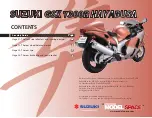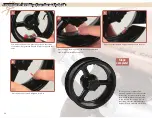
76
SUZUKI
GSX 1300R Hayabusa
: Assembly Guide
Shown above are a clean ‘new’ sprocket
(left) and a corroded ‘used’ sprocket (right).
You can use water to cause the corrosion,
or use the faster method of a salt solution
or vinegar. Whichever method you choose,
make sure that you check the surface
frequently, and remove the sprocket
when you have achieved the desired level
of corrosion. Make sure that you wash it
thoroughly afterwards.
Polish the raised details, such as the
heads of the bolts, with a cotton swab.
Apply the metal polish to both sides of the
sprocket’s teeth, and wipe them with a
cloth to clean off the corrosion. Repeat as
many times as you want, until you achieve
the desired finish.
When you are finished polishing the rear
sprocket, it’s a good idea to spray it with a
clear metal primer. This will preserve and
protect its surface.
Place the sprocket on some cardboard, and
spray it with the metal primer from about
25cm away. Move the spray back and forth
over the sprocket, never focusing on just
one area. When one side is done, turn the
sprocket over and spray the other side.
This is an example of a finished ‘used’
rear sprocket. This level of realism could
not easily have been achieved by using
paint. Use a toothbrush or cotton swab to
remove any unwanted residue left over
from the polishing process.
3
6
5
8
9
7
Corrosion can be triggered relatively
easily on the die-cast metal used to make
the sprocket. You can use water, which
to get the ‘used’ effect shown on the
right could take a few days to achieve.
Alternatively, you can speed up the
process by using a salt solution
or vinegar.
4
‘New’
‘Used’
After treating the sprocket to corrode the
surface, make it more realistic by polishing
the teeth, which on a real bike would be
kept clean by the chain. First, you will need
a cloth and some metal polish.
Tip































